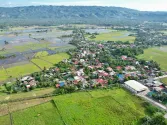
How resilient is Thailand amidst business risks and opportunities?
It ranked 64th place in the overall index.
The Land of Smiles found itself sitting at 64th place in FM Global Resilience Index, amidst a mix of business opportunities and risks.
Thailand has a population of over 71 million, and has evolved from an agricultural to a manufacturing and services-driven economy, contributing more than 90% of its GDP.
Key sectors include automotive and electronics, with growing investments in electric vehicles from China and Japan, earning Thailand a 39th ranking in logistics.
Despite these strengths, Thailand's 69th ranking for productivity indicates ongoing economic transition and digitalisation.
The country excels in inflation control, ranking 7th with a 2023 rate of 1.3%, thanks to government subsidies in energy, food, and healthcare. However, political risk and corruption control remain challenges, with rankings of 86th and 88th, respectively.
Cybersecurity (60th) and internet usage (53rd) rankings suggest robust connectivity and cyber risk management.
ALSO READ: Thailand focuses on industry transparency standards
Thailand's equatorial location exposes it to climate risks, reflected in its 111th ranking for urban development and significant climate change exposure (111th) and climate risk exposure (96th).
The country mitigates these risks through disaster preparedness programs, flood management infrastructure, and progressive environmental policies aimed at air and water pollution reduction and renewable energy promotion.
Thailand also ranks in the top half for Greenhouse Gas Emissions, balancing development with decarbonisation needs. Its energy intensity rank of 88th highlights high energy demands.
Building and fire safety are also focal points, with rankings of 70th and 73rd, respectively. Despite investments in modern fire safety technology, further improvements are needed.
Thailand’s resilience story is typical of economies with a dominant urban centre and concentrated industrial zones, where less developed areas hinder overall resilience.
For property and asset owners, understanding national and regional resilience factors is key to finding investment sweet spots.
The future looks promising as Thailand continues to invest in infrastructure, technology, and human capital to support economic growth and adapt to global changes.



















 Advertise
Advertise






